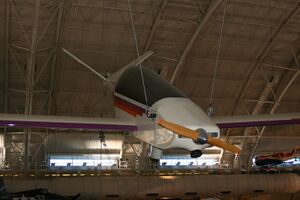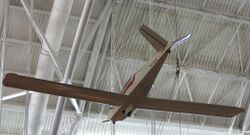Engineering:Monnett Moni
| Moni | |
|---|---|

| |
| Monnett Moni on display in the National Air and Space Museum | |
| Role | Sport aircraft |
| National origin | United States |
| Manufacturer | Monnett Experimental Aircraft Inc for homebuilding |
| Designer | John Monnett |
| First flight | July 24, 1981 |
| Number built | 380 kits sold between 1982 and 1986[1] |
| Variants | Electric Aircraft Corporation ElectraFlyer-C |
The Monnett Moni is a sport aircraft developed in the United States in the early 1980s and marketed for homebuilding.
Designed by John Monnett, who coined the term "air recreation vehicle" to describe it,[1] it is a single-seat motorglider with a low, cantilever wing and a V-tail. Construction is of metal throughout, and it is intended to be easy and inexpensive to build and fly. Like many sailplanes, the main undercarriage is a single monowheel, which in this case was mounted in a streamlined fairing beneath the fuselage and is not retractable, with a steerable tailwheel behind it. Builders are also given the option of constructing their example with fixed tricycle undercarriage.[2] Power is provided by a small two-cylinder, horizontally opposed, air-cooled engine.

Examples of the Moni are on display at the Steven F. Udvar-Hazy Center of the National Air and Space Museum,[3] and the EAA AirVenture Museum.[4]
Variants
The Sonex Xenos motorglider is an evolution of the Moni, and provided much of the design foundation for the Sonex line of aircraft.[5]
The all-electric-powered Electric Aircraft Corporation ElectraFlyer-C is a modified Monnett Moni in taildragger configuration.[6]
Specifications (with tricycle gear)
Data from [2]
General characteristics
- Crew: One pilot
- Length: 14 ft 8 in (4.46 m)
- Wingspan: 27 ft 6 in (8.38 m)
- Height: 3 ft 6 in (1.07 m)
- Wing area: 75 sq ft (7.0 m2)
- Empty weight: 260 lb (118 kg)
- Gross weight: 500 lb (227 kg)
- Powerplant: 1 × IAME KFM 107 , 30 hp (22 kW)
Performance
- Maximum speed: 120 mph (193 km/h, 100 kn)
- Cruise speed: 110 mph (177 km/h, 96 kn)
- Range: 320 mi (515 km, 280 nmi)
- Service ceiling: 12,500 ft (3,810 m)
- Maximum glide ratio: 20
- Rate of climb: 500 ft/min (2.5 m/s)
- Rate of sink: 167 ft/min (0.85 m/s)
Notes
- ↑ 1.0 1.1 "Monnett Moni". Smithsonian National Air and Space Museum website. Smithsonian Institution. http://collections.nasm.si.edu/code/emuseum.asp?profile=objects&newstyle=single&quicksearch=A19920066000. Retrieved 2008-10-08.
- ↑ 2.0 2.1 Jane's All the World's Aircraft 1984-85, 756
- ↑ "Monnett Experimental Aircraft, Inc. (MONI) Collection, 1981". Smithsonian Institution Research Information System. Smithsonian Institution. http://siris-archives.si.edu/ipac20/ipac.jsp?uri=full=3100001~!228134!0. Retrieved 2008-10-07.
- ↑ "Monnet Moni – N107MX". AirVenture Museum website. EAA. http://www.airventuremuseum.org/collection/aircraft/Monnett%20Moni.asp. Retrieved 2008-10-08.
- ↑ Rozansky, Murry: "Soaring with Sonex: Designer John Monnett returns to the motorglider scene with the two-place Xenos," April 2005, Kitplanes, retrieved August 22, 2020
- ↑ Laboda, Amy: "ElectraFlyer-C Concept Airplane Flying," August 1, 2008, Kitplanes retrieved August 22, 2020
References
- Jane's All the World's Aircraft 1984-85. London: Jane's Publishing. https://archive.org/details/janesallworldsai8485john.
 |
